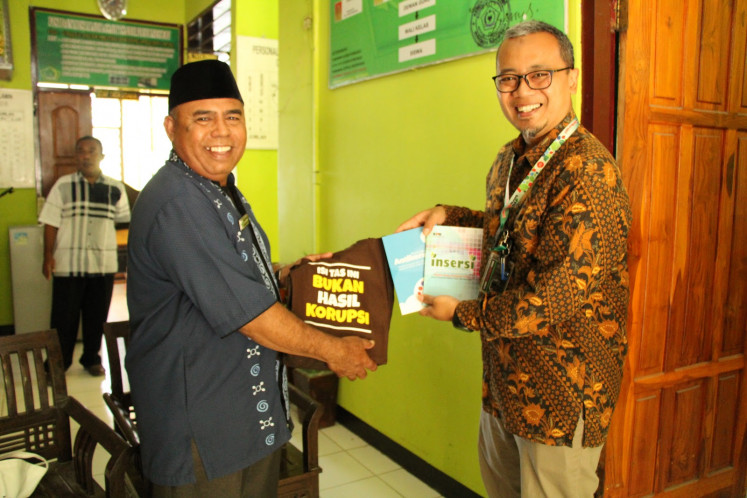Popular Reads
Top Results
Can't find what you're looking for?
View all search resultsPopular Reads
Top Results
Can't find what you're looking for?
View all search resultsNo fun: Popstars choose day jobs over a challenging career
Though it may look easy and endlessly fun from the outside, many musicians tire of the drama and uncertainty pop stardom brings
Change text size
Gift Premium Articles
to Anyone
F
or rock band Seurieus, the end came quick. “You get on stage, play the same songs, then you go home,” recalled Dinar Hidayat, their guitarist. “You forget to ask your bandmates how they’re doing. You forget that they’re your friends, and that you’ve fought for this for years. We didn’t realize that we were slowly losing ourselves.”
In 2008, just after the release of their fourth album Serdadu Rock, vocalist Candil suddenly announced his exit. “We didn’t stop to empathize with Candil. All we knew was, we were at the peak of our career,” Ramah recalled, ruefully. “Seurieus was touring constantly, playing at least four times a week. Some of us had mortgages and bought cars. This was a disaster.”
As gig offers stopped and Candil refused to return, financial ruin loomed for the members. At the time, Ramah had a side job as a lecturer at Jakarta State University (UNJ), but Seurieus was his dream and, crucially, his main source of income. “I sold off most of my equipment to sustain my lifestyle,” he said. “Eventually, I even sold my car.”
Dinar himself faced a slew of personal problems. “Things happened during those years that made me question my faith,” the 46-year-old revealed. “I began doubting that playing music was allowed in my religion.” Driven by a lust for spiritual renewal, he exited the band soon after. Having lost two of its founding members, the once formidable rock gods slowly withered into obscurity.
Around that time period, Beage’s burgeoning career began to drift. Their second album floundered amid low sales, a messy promotional campaign and poor management. After they exited Music Factory and signed with a different artist management, they realized the full extent of their troubles.
“Our new management asked us, ‘How could you sell 400,000 copies but no promoter even in small cities wants to take you on? That makes no sense',” Carlos recalled. “Those numbers didn’t tell the whole story. We realized far too late that the only real winners here were Music Factory and KFC.”
Dinar admits his years in obscurity has given him a refreshed perspective (Courtesy of Dinar Hidayat/Dinar Hidayat)By then, Samsons were also at a crossroads. They had been on a hiatus after the release of their third album in 2009, amid reports of burnout and tensions within the band. To make matters worse, their mercurial singer Bams announced his exit in 2012.
However, Irfan’s risky ploy of setting up their own music publishing firm had paid dividends. “We knew that most bands’ golden period only lasts for five years. After that, it’s going to be downhill. So we prepared for that,” Irfan said. “Setting up the company was a hassle, but after 15 years, we owned our own copyright, our masters and are in control of our management.”
This meant that Samsons could afford to take their time and consider their options. After Bams' acrimonious departure, the remaining members of Samsons collectively decided to shift their attention away from music and into their publishing company, Massive Music. Their company now manages the licensing and copyright of over 7200 songs by 700 composers. Unlike their peers, they managed a seamless transition away from the limelight.
For others, though, a return to civilian life only occurred after some difficult soul searching. “I was almost 30 when Beage stopped functioning as a band, and I started questioning my future,” Carlos said. “If I had to restart my life, I better do it as soon as possible.”
He opted to quit music entirely, taking on a job as a marketing specialist for an international school. “It was a shock at first,” he said. “Back when I was a singer, I didn’t even need to get my own water backstage. My road manager would just offer it to me. Now I’m in an office, and some obnoxious coworker is telling me to pick up some forms that she could pick up herself.”
In the end, he pulled through. He has been employed in the same school for the past six years, and joyously recalls how his background as a singer has given him the confidence to face any client. Carlos lives a peaceful, unassuming life with his wife and children in Tangerang.
Looking back, he realizes he made the right decision by leaving. “I was relieved, because I finally took a chance and moved away from my comfort zone,” he said.
Acceptance didn’t come so easy for Ramah. After Dinar and Candil exited Seurieus, he tried to keep the band going with a new vocalist, Deni “Boym” Iskandar. “I felt indebted to him, because we were the ones who took him into the band,” Ramah sighed. He worked tirelessly on their uncertain fifth album, constantly refusing full time job offers, including a lucrative teaching position in a Malaysian university.
And then, divine intervention. He had hesitantly applied for a vacancy at the Corruption Eradication Commission (KPK), knowing it meant he had to let go of Seurieus. As if by magic, the day the KPK informed him that he had got the job, Boym quit the band. “I felt it was a sign from God that my work here was done,” Ramah recalled. “I could finally move on.”
The austere lifestyle of a KPK official was a sea change. “We’re not allowed to receive payment for being speakers, be picked up from the airport by our host, or even receive gift baskets,” Ramah revealed. It was a rude awakening for the formerly boisterous rock star, but Ramah said people who knew him well were not surprised by his decision to join the KPK.”
Ramah Handoko (right) says his famous past has helped “break the ice” on many occasions, drawing cheers and gasps from his peers (Courtesy of Ramah Handoko/Ramah Handoko)
“I got to see many parts of the country for the first time with Seurieus,” Ramah recalled. “And it made me question many things. Why were the roads bumpy everywhere outside of Java? Why were so many places underdeveloped, yet they can afford to invite us? We forgot these questions once we got on stage, but on the way home, it hit us again.” For the past five years in the KPK, he has finally had the chance to confront these lingering questions.
Emerging from his spiritual journey, Dinar also learned to look beyond himself. In his years in the wilderness, he took on odd jobs: working in a recording studio, setting up stands for an event organizer and breaking his back in an advertising agency. Eventually, life led him to an unusual fate: opening a roadside nasi kuning (yellow rice) stall in Ciputat, Banten, with the help of his mother in law.
He was hesitant to reveal his past to his customers, fearful of being judged for his fall from grace. But the things he saw in his second act softened his stance. “Celebrities can respect and empathize with others, but we live in a bubble,” Dinar said. “We can’t truly feel what people feel.”
Life in his warung showed him the world beyond his narrow vantage point. “I had to go to the market at three in the morning to buy supplies, and I saw the vendors having a little karaoke dangdut party to get themselves going,” Dinar recalled. “Then the warung opens, and I meet people from all walks of life. Debt collectors, thugs, recent divorcees who just need a shoulder to cry on. Sometimes they recognize me, and they instantly open up.”
In spite of his newfound perspective, he still spent a long time away from music due to his spiritual doubts. “Until one day, I met a religious teacher who implored me to return to music,” Dinar said. “He told me, ‘When a thug repents, he doesn’t stay in the mosque. He returns to the streets and becomes a blessing.’ It took me years, but I finally found my answer.”
Again, cue divine intervention. As Dinar was mulling over this spiritual breakthrough, none other than Candil walked into his warung to say hello. The two old friends, now reunited, caught up with each other over nasi kuning and promised to record music together again. After Dinar’s warung closed down due to the pandemic, they started a business together, selling coffee under the banner Koprock.
“Turns out I just needed to step back,” Dinar said, chuckling. “These days music gives me joy again. That hasn’t happened for a while.”
Restarting after the pandemic
The pandemic, though, has made a similar transition harder to swallow for other musicians. Singer-songwriter Lala Karmela, for example, recently decided to take on an office job for the first time in her life. “There have been some gig offers during the pandemic, but because I live with my family, it’s too much of a risk,” the 35-year-old explained, speaking from her cubicle. “This meant I had a lot of downtime, so I decided to take on something new.”
She took the plunge and was hired by a financial technology company based in Jakarta last December. Like Dinar, she’s surprised to find herself enjoying her newfound civilian life. “It feels like you’ve had a mask on for so long, and now you can finally take it off,” she said. “I can just talk to my colleagues and be myself.”
After the release of her recent single, “Kau dan Aku”, Lala realized that success now takes on a different meaning. “It just goes from being amazing to really amazing,” she said. “Because everybody’s telling me the song is doing really well, yet here I am sitting in my cubicle, finishing a report before the deadline.”
The pandemic also forced Carlos to reconsider his past. After years away from music, he reconnected with his former bandmates and released “Berdansa Denganku”, a previously unreleased song recorded just before Beage broke up.
“I realized I missed my friends, and I wanted to pay tribute to the things we went through,” he said. Carlos laughed off suggestions that Beage would reunite, though, saying that his suburban bliss was more than enough.
Time has granted Ramah a similar peace of mind. “Perhaps it’s only right that God stopped us where we were. He wanted us to be wiser and closer to our families,” he said. “We were having so much fun back then. We forgot what it felt like to step on Earth.”
This is part 2 of 2. Part 1 was published yesterday.












